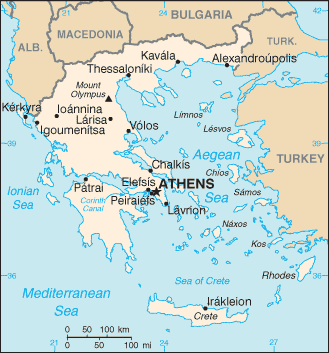Airspace: 207,289 square miles
Recent Airspace Conflicts
The boundaries of national airspace claimed by Greece are exceptional, as they do not coincide with the boundary of its territorial waters. Greece possesses 10 nautical miles of airspace, as opposed to 6 nautical miles of water. Since 1974, Turkey has refused to acknowledge the validity of those outer 4 miles of airspace that extend beyond Greek territorial waters. Turkey refers to legal statutes of the International Civil Aviation Organization of 1948 that contains a binding definition that both zones must coincide. Greece argues that its 10-mile claim was fixed in 1931 and therefore predates the ICAO statute. Greece further argues that because its claim was acknowledged by all of its neighbors, including Turkey, before and after 1948, Greece’s claim is thus an established right.
These conflicts over airspace have been one of the most frequent and long-standing sources of tension between Turkey and Greece, giving rise to regular incidents between their fighter jets. Turkish air force jets routinely fly in the outer 4-mile zone of contested airspace, while Greek air force jets just as routinely intercept Turkish planes and force them to leave. This has led to dangerous so-called “virtual dogfights,” which sometimes involve armed aircraft. Greece and Turkey’s long-standing dispute over airspace and territorial rights in the Aegean have almost culminated three times in armed conflict since 1974.
Airspace Regulatory Body
Hellenic Civil Aviation Authority: A subsidiary of the Ministry of Transport and Communications.
Membership in International Aviation Organizations
EUROCONTROL: An international governmental organization with 31 member states. Among its many services, this organization seeks to fulfill the needs of civil and military aircraft through the Flexible Use of Airspace mandate. This approach attempts to avoid airspace restrictions due to military operations by limiting the duration of restrictions to coincide with the duration of military operations, thus not blocking large areas of airspace for lengthy periods of time. Furthermore, it aims to break down national airspace barriers and develop a single upper airspace for use by partner countries through the Single European Sky mandate.
Sources: The Hellenic Civil Aviation Authority, CNN, Federal Aviation Administration, International Civil Aviation Organization



